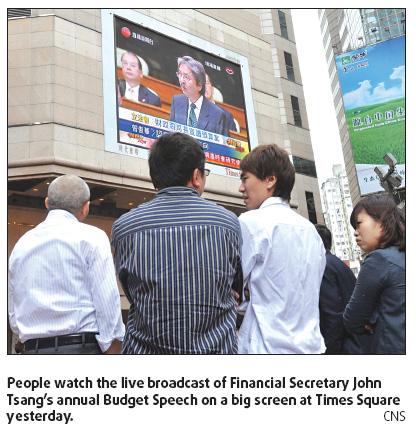On the street: mixed reviews for budget initiatives
Updated: 2010-02-25 07:34
By Ming Yeung(HK Edition)
|
|||||||

HONG KONG: On the streets of Hong Kong people are saying the HK$20.4 billion worth of relief measures introduced by the government is generous, but they think the government should consider giving assistance to groups rather than the grass roots.
Delivering his third annual budget speech in the Legislative Council yesterday, Financial Secretary John Tsang acknowledged the burden people face due to emerging inflationary pressure, while they have not yet started to enjoy the benefits of returning prosperity. To address the outcry for short-term relief measures, the administration proposed a series of one-off measures to alleviate burdens on people.
Public housing tenants will enjoy a rent exemption for two months. Mrs Tang, 56, who lives in public housing welcomes the two months of rent free living introduced in the budget. "I would consider buying a new sofa with the extra money," she said.
The HK$20.4 billion relief measures will undoubtedly assist the grass roots to meet pressing needs, however, citizens sandwiched between the grass roots and the middle class do not feel they are the actual beneficiaries.
Ms Hung, a mother of two children, criticized the measures intended to provide greater opportunities for children of needy families receiving Comprehensive Social Security Assistance (CSSA). "My husband earns around HK$20,000 a month and thus is not eligible to apply for CSSA. The HK$1,000 allowance and HK$1,300 subsidy for Internet access charges do not do any good for my kids," she noted.
Mr Yeung, a 54-year-old IT manager with an income of HK$80,000 a month, feels the budget is only a rehash and lacks new initiatives. "The budget ignores the middle-income group. We are afraid of losing jobs, but the government has not given thought to implement any unemployment measures," he observed.
Even though some people are dissatisfied with the relief measures, Shirley Hung, assistant professor of Social Work at the Hong Kong Baptist University, believes the government, to a certain extent, has taken people's opinions into account on ways to distribute assistance to the needy.
"For years, NGOs have urged the government to provide subsidies for Internet access charges for the poor families and finally the secretary accepted it," Hung said. However, the government should keep track of the operations of the private service providers. If not, the subsidies could become a target for companies to make profits," she added.
The relief measures have not actually benefited the working poor group - people who are not living in the public housing and do not need to pay salaries tax as well as rates, Hung said. "These people live in decades-old buildings and earn chicken-feed and are not eligible to apply for public housing."
"The main reason for their poverty is lack of suitable jobs for these low-skilled, middle-aged people. As the government is promoting a knowledge-based economy, the administration should enhance training for them to adapt to the ever-changing environment. These value-added measures will ultimately ease the burden of government to provide more allowances," Hung suggested.
"We are hoping the government will legislate a minimum wage as soon as possible and at the same time, study the means to improve living standards of the working poor in the next budget," Hung said.
(HK Edition 02/25/2010 page2)